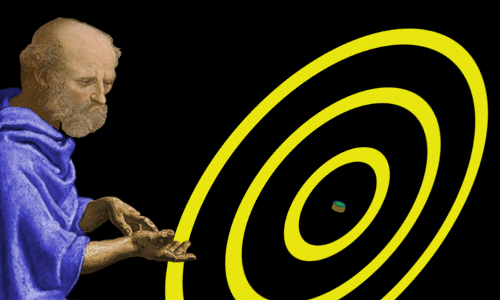Anaximander of Miletus-Urdu

آناکسیماندروس یونانی فلسفی
Student of Thales, Anaximander (c. 610 – 546 B.C.) was an early Pre-Socratic philosopher from the Greek city of Miletus in Ionia (modern-day Turkey). He was a key figure in the Milesian School, as a student of Thales and teacher of Anaximenes and Pythagoras. Anaximander was born in the Greek city of Miletus (on the Ionian coast of modern-day Turkey) in about 610 B.C. He was the son of Praxiades, but little else is known of his life.
First True Scientist
He was an early proponent of science and is sometimes considered to be the first true scientist. He conducted the earliest recorded scientific experiment. He is often considered the founder of astronomy. He tried to observe and explain different aspects of the universe and its origins. He described the mechanics of celestial bodies in relation to the Earth. He made important contributions to cosmology, physics, geometry, meteorology, and geography as well as to Metaphysics.
Father of Cosmology
Anaximander is sometimes called the “Father of Cosmology” and the founder of astronomy for his bold use of non-mythological explanations of physical processes. He was the first to conceive a mechanical model of the world. He envisioned the Earth as a cylinder with a height one-third of its diameter. The flat top forming the inhabited world, surrounded by a circular oceanic mass. This theory allowed for the concept that celestial bodies could pass under or around it. He provided a better explanation than Thales’ claim of a world floating on water (what would contain this ocean?).
Lasting Influence
While Thales had already dispensed with divine explanations of the world around him, he had not written a book about his philosophy. Moreover, Anaximander went much further in trying to give a unified account of all of nature. Although Anaximander’s primitive astronomy was soon superseded. His an effort to provide a rational explanation of the world had a lasting influence.
Place of the Earth
He had learned from Thales that the earth is a disk floating in an infinite ocean of water. Thales’ theory suggests that he had looked at the night sky and seen lots of bright disks. Describing the earth as a disk would, therefore, have seemed perfectly logical. Alternatively, the disk idea might have come from the fact that the horizon, provided it’s unobstructed, is circular.
Storm and Rains
Thales had attempted to explain earthquakes as a natural phenomenon rather than the actions of angry gods. He did the same for lightning storms, which he said are caused by disturbances in the air. Lightning results from the violent air flow, while thunder results from the collisions of clouds. Rain is produced by water that has risen from the earth by the heat of the sun. He was worried that one day all of earth’s water could be lost by this process.
Note: This article was originally published on our related blog. We have merged content from our educational subdomains to provide easier access in one place. The original post is still available at: http://www.books.urdutubes.com/2019/04/anaximander-of-miletus-urdu.html
All content is owned and authored by us, and redistribution or reuse is not allowed without permission.
Note: This post is part of our content merger from multiple educational subdomains. To access the original content, visit: books.urdutubes.com for book-related content, PDFs, and downloads, or videos.urdutubes.com for video-related posts. All content is owned and authored by us, and redistribution or reuse is not allowed without permission.




![Khawateen Digest February 2025 [Download PDF] Khawateen Digest – February 2025 Edition: A Must-Read for Every Woman! The February 2025 issue of Khawateen Digest is packed with engaging stories, insightful articles, and practical tips that cater to the modern woman. From inspiring tales to expert beauty and health advice, this edition has it all. Whether you're in the mood for a gripping story or seeking helpful tips for daily life, this digest will keep you hooked. Don't miss out on the latest edition – download the Khawateen Digest February 2025 now and enjoy a well-rounded read that speaks to every woman's interests.](https://www.urdutubes.com/wp-content/uploads/2025/04/Khawateen-Digest-February-2025-Download-PDF-218x150.jpg)
![Khawateen Digest January 2025 [Download PDF] Khawateen Digest January 2025 [Download PDF]](https://www.urdutubes.com/wp-content/uploads/2025/04/Khawateen-Digest-January-2025-Download-PDF-218x150.jpeg)
![Kiran Digest April 2024 [Download PDF] Kiran Digest April 2024 [Download PDF]](https://www.urdutubes.com/wp-content/uploads/2025/04/Screenshot-2025-04-13-113317-218x150.png)
![Kiran Digest March 2024 [Download PDF]](https://www.urdutubes.com/wp-content/uploads/2018/05/KiranDigestMay2018255BDownloadFreePDF255D.jpg)







